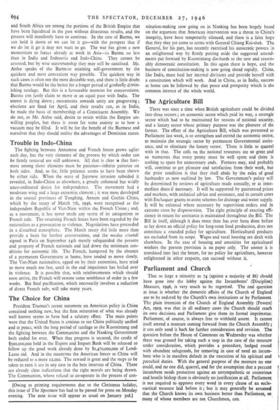The Agriculture Bill
There was once a time when British agriculture could be divided into three sectors ; an economic sector which paid its way, a strategic sector which had to be maintained for reasons of national security, and a luxury sector whose primary purpose was the pleasure of the farmer. The effect of the Agriculture Bill, which was presented to Parliament last week,, is to strengthen and extend the economic sector, to maintain the strategic sector by permanent Governmental assist- ance, and to eliminate the luxury sector. There is little to quarrel with in that. The calls on the national resources are so great and so numerous that every penny must be well spent and there is nothing to spare for unnecessary ends. Farmers may, and probably will, continue to get pleasure and satisfaction from their work, but the prior condition is that they shall abide by the rules of good husbandry as now outlined by law. The Government's policy will be determined by reviews of agriculture made annually, or at inter- mediate dates if necessary. It will be supported by guaranteed prices and markets, with technical advice and assistance, and in certain cases with Exchequer grants to assist schemes for drainage and water supply. It will be enforced where necessary by supervision orders and in extreme cases by dispossession. The right principle of exacting effi- ciency in return for assistance is maintained throughout the Bill. The Bill in itself, although it does more than has ever been done before to lay down an official policy for long-term food production, does not constitute a rounded policy for agriculture. Horticultural products are excluded from its scope. Wages and rural housing are dealt with elsewhere. In the case of housing and amenities for agricultural workers the present provision is on paper only. The sooner it is translated into fact the better, for no policy for agriculture, however enlightened in other respects, can succeed without it.






























 Previous page
Previous page